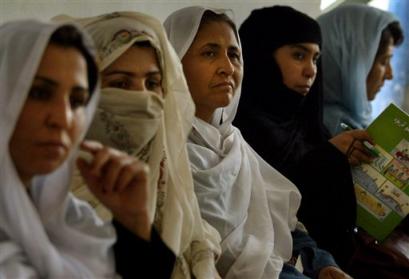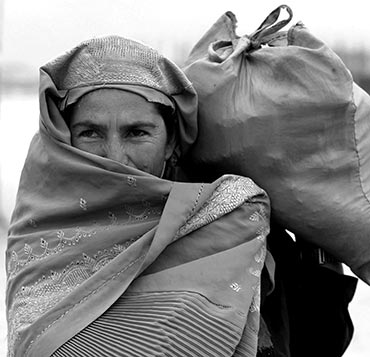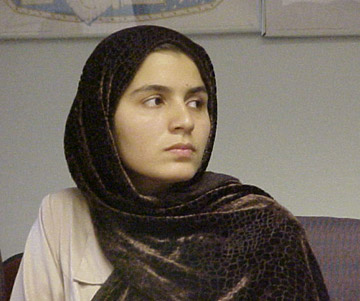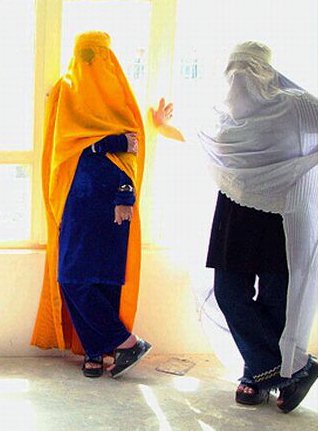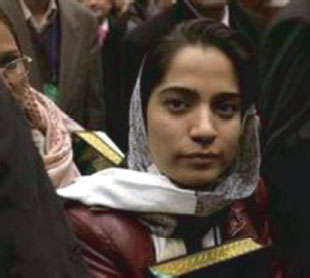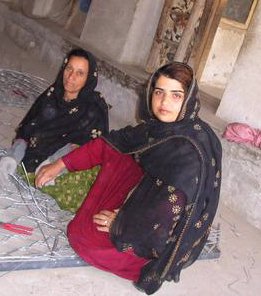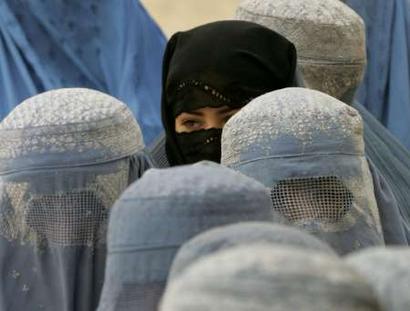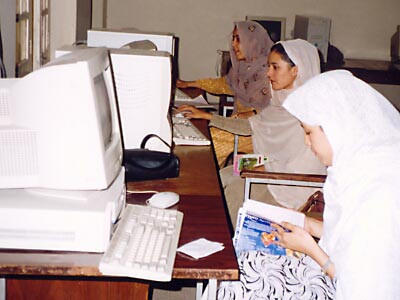 |
||||
|
Taliban & Afghan Women
The Taliban & Afghan Women: BackgroundOn September 27, 1996, the Taliban, an extremist militia, seized control of the capital of Afghanistan, Kabul, and violently plunged the occupied territories of Afghanistan into a brutal state of gender apartheid in which women and girls have been stripped of their basic human rights. "If this was happening to any other class of people around the world, there would be a tremendous outcry. We must make sure these same standards are applied when it is women and girls who are brutally treated." -Eleanor Smeal, President, FMF. Gender Apartheid | Taliban in Opposition to Islam | Who Is the Taliban | US Corporate Interests | Humanitarian Crisis | FMF's Campaign
Gender Apartheid - The Elimination of Women's Rights Upon seizing power, the Taliban instituted a system of gender apartheid effectively thrusting the women of Afghanistan into a state of virtual house arrest. Under Taliban rule women have been stripped of their visibility, voice, and mobility. When they took control in 1996, the Taliban initially imposed strict edicts that:
Women were brutally beaten, publicly flogged, and killed for violating Taliban decrees. Even after international condemnation, the Taliban made only slight changes. Some say it was progress when the Taliban allowed a few women doctors and nurses to work, even while hospitals still had segregated wards for women; that in Kabul and other cities, a few home schools for girls were allowed to operate, although only in secret. In addition, women who conducted home schools were risking their lives or a severe beating. But the overall reality of the tragic plight of Afghan women and girls remained virtually unchanged. The early 2002 defeat of the Taliban liberated Afghan women and girls from the regime's draconian decrees. The world witnessed reports of women in Mazar-e-Sharif, Kabul, and other cities going into the streets without male relatives and discarding their burqas--actions that would have garnered brutal punishments under the Taliban.
However, the international community must now act to ensure that women's rights are fully and permanently restored, and to reestablish a constitutional democracy in Afghanistan that is representative of women and ethnic minorities. Gender Apartheid - The Reality of Women and Girls
Taliban Law Is In Opposition To Islam Prior to the Civil War and Taliban control, especially in Kabul, the capital, women in Afghanistan were educated and employed: 50% of the students and 60% of the teachers at Kabul University were women, and 70% of school teachers, 50% of civilian government workers, and 40% of doctors in Kabul were women. The Taliban claim to follow a pure, fundamentalist Islamic ideology, yet the oppression they perpetrate against women has no basis in Islam. Within Islam, women are allowed to earn and control their own money, and to participate in public life. The 55-member Organization of Islamic Conference has refused to recognize the Taliban as Afghanistan's official government. The Muslim Brotherhood in Egypt, regarded by many as an ultraconservative organization, has denounced the Taliban's decrees.
Who is the Taliban? During the Soviet occupation of Afghanistan in the 1980's the United States through a CIA covert operation based in Pakistan supplied billions of dollars to support insurgent militia forces called the mujahideen (soldiers of God). Following the Soviets' withdrawal in 1989, factions of the mujahideen fell into a civil war and in 1994, the Taliban emerged as a dominant force. The Taliban is comprised of young men and boys of Afghan descent who have hardly lived in Afghan society. They were raised in refugee camps and trained in ultraconservative religious schools (madrasahs) in Pakistan. Pakistan, Saudi Arabia, the United Arab Emirates are the only countries that have granted the Taliban official recognition. In addition, thousands of Pakistanis and hundreds or Arabs fight alongside the Taliban. Pakistan is the primary source of support to the Taliban, supplying military aid and personnel; Saudi Arabia, the United Arab Emirates and known terrorist organizations provide the Taliban with financial support. Additionally, Afghanistan is the one of the world's two largest producers of opium and a major drug-processing center; almost all areas of poppy cultivation are occupied by the Taliban. But perhaps the biggest potential for financial support lies in the petroleum industry. The Taliban is sheltering Saudi terrorist Osama bin Laden. In turn, bin Laden is providing substantial support to the Taliban as reported by The Guardian on September 5, 2001. Arab fighters funded by bin Laden have become increasingly influential with the Taliban and are building a foreign alliance to expand the Taliban's extremist version of Islam, according to aid workers and political analysts. Arab mercenaries have already participated in civilian massacres against minority Shia Muslims in central Afghanistan earlier this year, and Islamic aid agencies, at least one of which is believed to be funded by bin Laden, have recently set up offices in Kabul.
U.S. Corporate Interests and the Taliban International oil interests are in fierce competition to build pipelines through Afghanistan to link Caspian Sea oil and gas reserves to Central and South Asia. California-based UNOCAL, a US energy company, led the CentGas consortium that planned to build an oil and gas pipeline through Afghanistan. The Taliban stood to gain over $100 million a year from this pipeline. UNOCAL announced it was suspending the project at the end of 1998, citing in part, pressure from feminist organizations protesting the company's involvement with the Taliban. Other US and international corporate interests are vying for business in the country. Recently, Telephone Systems International (TSI), a New Jersey-based telecommunications firm, reached an agreement with the Taliban to install a satellite-based system throughout Afghanistan. Corporate investment under current conditions could mean billions of dollars to shore up the Taliban regime without regard for women's rights.
The Humanitarian Crisis Millions of people in Afghanistan are in the most desperate poverty imaginable. Added to the Taliban's barbaric rule, the region is suffering under the most severe drought in decades and military incursions continue to displace hundreds of thousands of Afghans. As the U.N. asks for humanitarian assistance from the nations around the world, the Taliban puts impossible restrictions on the international organizations that are trying to deliver food and medicine to desperate Afghans. Workers for international aid organizations are continually harassed, subjected to unreasonable restrictions, and even arrested, by the Taliban. Afghan refugees, who comprise the largest refugee population in the world today, are facing insurmountable odds. Both Iran and Pakistan are forcing Afghan refugees to return to Afghanistan to almost certain death. A ship with hundreds of Afghan refugees rescued by the crew of a Norwegian ship became an international pariah as the government of Australia refused assistance while the ship, crowded with many ill and starving refugees, sat within view of residents of Australia's Christmas Island.
The Campaign to Help Afghan Women and Girls In 1997, a group of feminists launched the Campaign to Stop Gender Apartheid in Afghanistan to urge the US government and the U.N. to do everything in their power to restore the human rights of Afghan women and girls. Chaired by Mavis Leno, the campaign has brought together more than 200 leading human rights and women's organizations to condemn the Taliban's human rights abuses against women and girls and to put pressure on the US and UN to end gender apartheid in Afghanistan. The Campaign has been successful in increasing public awareness about the plight of women and girls in Afghanistan, preventing US and UN recognition of the Taliban, increasing the admission of Afghan women and girls as refugees, increasing humanitarian aid to the region and pressuring UNOCAL, a California oil company to abandon its plans for an Afghan oil and gas pipeline which would have produced over $100 million in royalties for the Taliban. With the fall of the Taliban regime, the campaign is now working to convey to the world that women are an essential part of the solution for the future of Afghanistan. In 2002, the campaign has intensified its nationwide public education campaign - renaming it the Campaign to Help Afghan Women and Girls- to win the full and permanent restoration of women's rights, promote the leadership of women in the planning and governing of post-Taliban Afghanistan, increase and monitor the provision of emergency and reconstruction assistance to women and girls, urge the expansion of peace-keeping forces, and support the Afghan Ministry for Women's Affairs and Afghan women-led non-governmental organizations (NGOs).
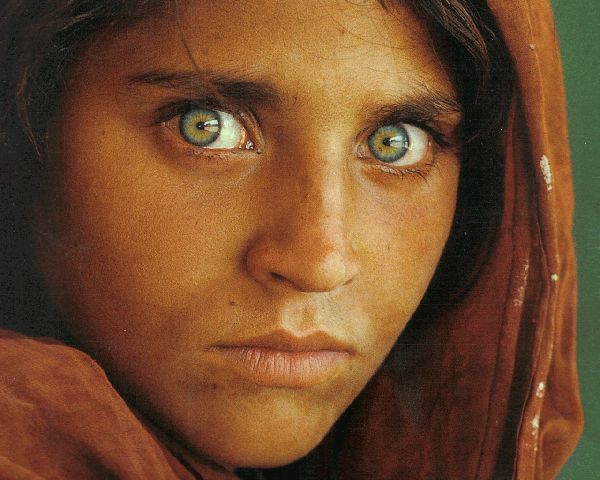
|
||||
|
|
||||
|
|
||||
 |
|
 |
||
